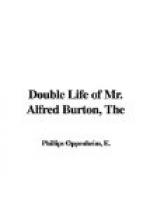“Has he come into a fortune, or what?” Maud demanded. “He’s left you, hasn’t he?”
Mr. Waddington nodded.
“He’s found a better job,” he admitted. “Kind of queer in his health, though. I’ve been taken a little like it myself, but those sort of things pass off—they pass off.”
Milly looked at him curiously. He was suddenly quiet.
“Why, you’re looking just like Mr. Burton did a few minutes ago!” she declared. “What’s the matter with you? Can you see ghosts?” Mr. Waddington sat quite still. “Yes,” he muttered, “I see ghosts!”
They looked at him in a puzzled manner. Then Milly leaned towards him and filled his glass with Wine. She touched his glass with her own, she even suffered her arm to rest upon his shoulder. For a single moment Mr. Waddington appeared to feel some instinct of aversion. He seemed almost about to draw away. Then the mood passed. He drew her towards him with a little burst of laughter, and raised his glass to his lips.
“Here’s fun!” he exclaimed. “Poor old Burton!”
CHAPTER XXVIII
THE REAL ALFRED BURTON
Edith slipped out of her evening cloak and came into the foyer of the Opera House, a spotless vision of white. For a moment she looked at her cavalier in something like amazement. It did not need the red handkerchief, a corner of which was creeping out from behind his waistcoat, to convince her that some extraordinary change had taken place in Burton. He was looking pale and confused, and his quiet naturalness of manner had altogether disappeared. He came towards her awkwardly, swinging a pair of white kid gloves in his hand.
“Bit late, aren’t you?” he remarked.
“I am afraid I am a few minutes late,” she admitted. “Until the last moment father said he was coming. We shall have to go in very quietly.”
“Come along, then,” he said. “I don’t know the way. I suppose one of these fellows will tell us.”
His inquiry, loud-voiced and not entirely coherent, received at first scant attention from the usher to whom he addressed himself. They were directed to their places at last, however. The house was in darkness, and with the music Edith forgot, for a time, the slight shock which she had received. The opera was Samson et Dalila, and a very famous tenor was making his reappearance after a long absence. Edith gave herself up to complete enjoyment of the music. Then suddenly she was startled by a yawn at her side. Burton was sitting back, his hands in his pockets, his mouth wide-open.
“Mr. Burton!” she exclaimed softly. He had the grace to sit up. “Long-winded sort of stuff, this,” he pronounced, in an audible whisper.
She felt a cold shiver of apprehension. As she saw him lounging there beside her, her thoughts seemed to go back to the day when she had looked with scornful disdain at that miserable picnic-party of trippers, who drank beer out of stone jugs, and formed a blot upon the landscape. Once more she saw the man who stood a little apart, in his loud clothes and common cloth cap, saw him looking into the garden. She began to tremble. What had she done—so nearly done! In spite of herself, the music drew her away again. She even found herself turning towards him once for sympathy.




